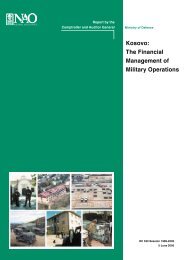Department of Health: The Paddington Health Campus Scheme
Department of Health: The Paddington Health Campus Scheme
Department of Health: The Paddington Health Campus Scheme
Create successful ePaper yourself
Turn your PDF publications into a flip-book with our unique Google optimized e-Paper software.
summary21 Ultimately, in addition to the land and affordabilityissues, it was the differing financial and clinical interests<strong>of</strong> the two NHS Trusts that led to St Mary’s NHS Trustapproving the revised business case in 2005 and theRoyal Brompton and Harefield NHS Trust declining torecommend it for approval. This reflected, in part, the lack<strong>of</strong> confidence on the part <strong>of</strong> the Brompton in St Mary’sability to deliver savings and manage a forecast deficitwithout compromising the <strong>Campus</strong> vision.22 Throughout the development stage, the scheme washandicapped by the <strong>Campus</strong> partners’ failure to provideor secure adequate funding to develop the scheme.Available development funding was based on a proportion<strong>of</strong> the original estimated OBC cost <strong>of</strong> £360 4 million,not the approximately £894 million it would have cost.<strong>The</strong> scheme relied on funding from the Strategic <strong>Health</strong>Authority and Primary Care Trusts. However, between2002 and 2005 the scheme was unable to secure sufficientproject funding from them and the Trusts themselves feltunable to find funding from within their own resources.Instead, the continuation <strong>of</strong> the scheme was reliant on£4.9 million in funding from co-sponsor PartnershipsUK. As a result <strong>of</strong> the earlier inadequate funding anduncertainty about the future <strong>of</strong> the scheme, it was severelyunder-resourced in manpower and capability.<strong>The</strong> strategic support for the <strong>Paddington</strong><strong>Health</strong> <strong>Campus</strong> vision was unsatisfactory23 <strong>The</strong> <strong>Department</strong> provided support andencouragement to the <strong>Campus</strong> partners – mainly on thefinancial challenges facing the scheme – both through itsmembership <strong>of</strong> the Principals’ Group and access to thesenior responsible <strong>of</strong>ficial at the <strong>Department</strong>. It also setout its assessment <strong>of</strong> the conditions necessary for successon numerous occasions and <strong>of</strong>fered limited capital andrevenue funding to support the scheme.24 However, the <strong>Department</strong> had no strategic positionon the desirability to the NHS or ’UK plc’ <strong>of</strong> a successfulhealth <strong>Campus</strong>. It did not share the <strong>Campus</strong> partners’ viewthat this was a scheme <strong>of</strong> national importance. As a matter<strong>of</strong> policy the scheme was treated as the responsibility <strong>of</strong>the local NHS to resolve, as budgets had been devolvedto local NHS organisations. <strong>The</strong> two NHS Trusts,Partnerships UK and Westminster City Council told usthat they had been uncertain whether the <strong>Department</strong> didin fact want the <strong>Campus</strong> scheme to succeed, while the<strong>Department</strong> has explained that it was willing to supportan affordable scheme.25 <strong>The</strong> <strong>Department</strong> was clear that its two roles inrespect <strong>of</strong> the scheme were a) to <strong>of</strong>fer advice on schemeparticulars and development and b) to consider the FullBusiness Case. Approval <strong>of</strong> the 2000 OBC was delegatedto the London Regional Office <strong>of</strong> the NHS and the<strong>Department</strong> played no role at that stage. <strong>The</strong> <strong>Department</strong>,from mid-2004, expressed its concerns as to the viability<strong>of</strong> the scheme. At no point did it ask the <strong>Campus</strong> partnersto carry out further work on the scheme but it respondedpositively to requests that the scheme be allowed time toexplore new opportunities.26 <strong>The</strong> <strong>Campus</strong> partners believe the <strong>Department</strong>played a more active role than this suggests. Nosubstantive steps were taken by the <strong>Campus</strong> partnersfrom April 2004 to May 2005 without the consent <strong>of</strong> thesenior responsible <strong>of</strong>ficial at the <strong>Department</strong>. <strong>The</strong> <strong>Campus</strong>partners believed they had political strategic support foran affordable scheme.4 <strong>The</strong> development funding was based on the full £360 million cost <strong>of</strong> the 2000 OBC, but £27 million related to other hospitals and £33 million to equipmentcosts so the capital construction cost <strong>of</strong> the <strong>Paddington</strong> scheme was only £300 million.<strong>The</strong> <strong>Paddington</strong> <strong>Health</strong> <strong>Campus</strong> scheme
















